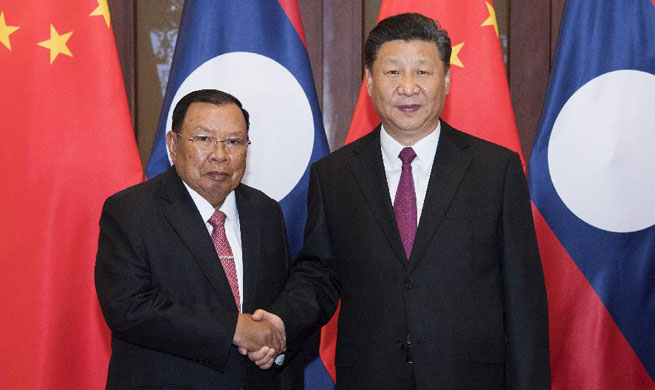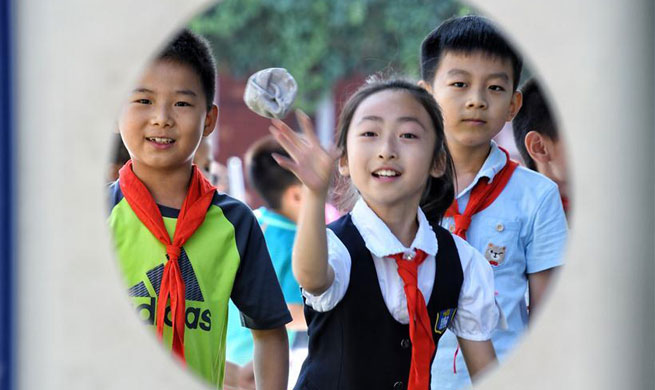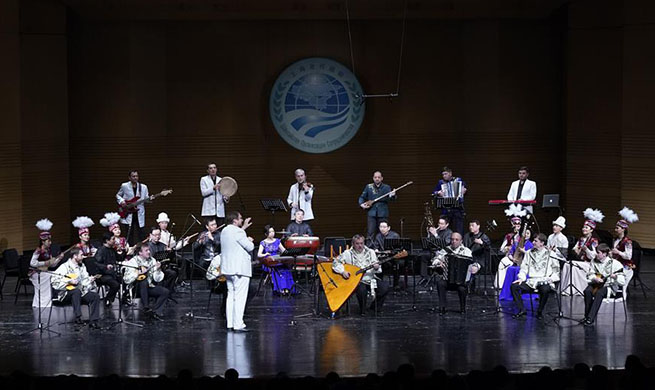GUANGZHOU, May 31 (Xinhua) -- Like a real estate agent, Liu Zhibing's job is to connect buyers and sellers, but he trades technology instead of houses. In what is a demanding job, he sells the technological advances created by university research to private companies.
At the Second China University Scientific and Technological Achievements Fair, which opened last week in Huizhou, a city in south China's Guangdong Province, Liu succeeded in brokering three deals.
The four-day fair attracted 293 universities and 626 companies, and saw 732 technology transactions worth 4.06 billion yuan (about 644 million U.S. dollars).
Six universities and companies, from home and abroad, signed a memorandum of cooperation to carry out personnel exchanges to promote international tech transfer.
"My job is to help connect professors, universities and companies as well as provide counseling and agency services in the technology transfer process," Liu said. "So university professors could focus on their research instead of spending time on commercialization of their work."
According to the Ministry of Education, Chinese universities were granted more than 179 billion yuan in research funding from 2012 to 2016. The direct trade volume of university sci-tech achievements, however, was only worth about 13 billion yuan.
"There are still a large number of inventions and innovation fruits not applied to practical use due to a lack of connection between universities and the market," Liu said.
When Liu came to work as an engineer after graduating from Nanjing Tech University, east China's Jiangsu Province, in 2010, he found that his company paid a lot of money for old manufacturing equipment from foreign companies that had already upgraded equipment by applying the latest innovations from universities.
Thinking that Chinese universities also have great potential to solve industrial problems, Liu decided to quit his engineering job and found a new one working as a technology transfer agent in 2012.
Over the past six years, Liu has brokered about 50 technology transfer transactions worth 4 million yuan in total.
"I attended one or two exhibitions each month to collect the latest tech information and seek potential clients," Liu said. "Being a technology transfer agent is not an easy job. A qualified technology agent should have sharp eyes not only to find university innovations that could match the needs of the market, but also have strong capabilities of making the right judgement on research achievements that will have huge market potential."
It is a complicated process to transfer tech innovation into commercial use, which includes cautious evaluation on technology, industry research, business cooperation negotiations, as well as preparation of legal documents and contacts.
"A technology agent should often attend professional training to know more about technology, marketing and laws," Liu said.
In early May, Liu and 84 technology agents attended a training course organized by the Science and Technology Development Center of the Ministry of Education.
"We are committed to training a group of technology agents who have global vision and know international rules well," said Xing Feifei, director of the Industry-University-Research Cooperation Office of the Ministry of Education.
Chinese universities have made significant efforts to increase the number of specialized technology transfer talent. As early as 2008, Beijing University of Technology opened a master's degree course in software engineering for technology transfer. Sun Yat-sen University adopted a market-based mechanism for technology transfer by setting up a company to provide intellectual property service.
Many multinational technology service providers have also launched tech transfer business in China. The Sino-Russian Technology Transfer (Southern) Center was established in Shenzhen, south China's Guangdong Province, in April, with a plan to provide services for incubation, research and development and technology commercialization by setting up a hi-tech investment and start-up service center, property right transaction center and a technology industrial park.
Industry insiders believe that there will be more professional and international talent in the technology transfer field to meet market demand.
China will train 10,000 professional technology transfer personnel, hoping to bring trade volume of technology transfer to 2 trillion yuan by 2020, according to an action plan regarding promotion of transfer and transformation of scientific and technological achievements, which was issued by the State Council in 2016.

















